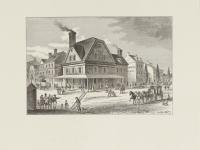“All honest men should support their country, by cheating their creditors” - satirical remark that appeared in the Pennsylvania Gazette, 21 September 1785 (quoted in Wilson, pg. 12)
Although the United States today, and New York City in particular, might be considered the center of the world’s banking and financial systems, this was certainly not true when the country was founded – a time when modern capitalism was in its infancy and Philadelphia was the financial center of the former colonies. The first generation of American politicians grappled with fundamental issues of capitalism and government while they were formulating ideas that would eventually turn into the Constitution and subsequent Bill of Rights.
This can especially be seen in the intense debates concerning the legality of America’s first bank (The Bank of North America) in the mid-1780’s. Founding Fathers including Benjamin Franklin, Robert Morris, and Thomas Paine weighed in on the establishment of the bank, and a conflict divided these politicians, and roughly predicted the so-called “First Party System.” The Revolutionary generation’s reflections on (and divided opinions of) the capitalist system cast some interesting observations that are still relevant today, even if they were speaking from the beginning of the epoch.
This is an important lesson and can be used in U.S. Government, Economics, and/or American History courses. On the other hand, the significance of this 18th century debate encouraged the preservation of many sources now held by the Historical Society of Pennsylvania, some of which have been digitized as part of this lesson plan. Teachers are encouraged to differentiate according the needs and abilities of their students, and consider using these sources in the construction of a student-created research paper, but this lesson as written requires a straightforward "source-analysis."

